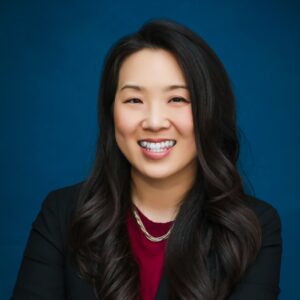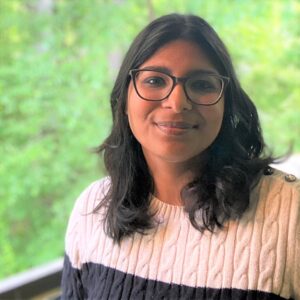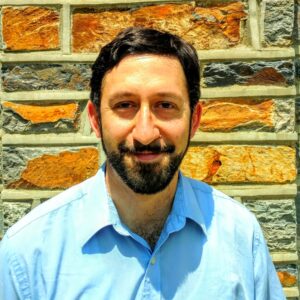What is a college education for? What role does it play in the development of students? And how can faculty help undergraduates navigate their formative years in college?
Katherine Jo believes that college educators need time and space to reflect on these questions—and not just when a student’s personal challenges become apparent in the classroom.
Along with colleague Jesse Summers, she launched a new program, Teaching on Purpose, to help doctoral students approach teaching in ways that support their students’ flourishing as learners and human beings.

Jo is the Director of Program Development and Design for the Purpose Project at Duke—a partnership between the Kenan Institute for Ethics, Duke Divinity School, and the Duke Office of Undergraduate Education, funded by The Duke Endowment. The Purpose Project seeks to integrate questions about meaning, purpose, and character development into university education.
Research demonstrates that traditional undergraduate students (between the ages of 18–22) are in a key developmental phase. As “emerging adults,” students are grappling with who they are, who they want to become, and how to make sense of a complicated world.

“It’s bringing a philosophical, holistic approach to teaching,” Jo said of Teaching on Purpose. “We’re thinking of students as whole people, instead of seeing their intellectual activity as separate from their wellbeing and their thinking about the world and their place in it.”
The program also encourages doctoral students to reflect on their own professional identities—not only as scholars, but as educators—and how their discipline connects to questions of meaning and purpose.
Though these questions are not typically associated with STEM disciplines, “it’s not just for the humanities,” Jo said. “Professors can bring these questions into every class. If you’re an engineer, what are you building for?”
This spring’s 17 Teaching on Purpose Fellows come from a variety of Duke University schools, from the School of Medicine to the Nicholas School of the Environment. They represent disciplines as diverse as Literature and Electrical and Computer Engineering.
Jo and Summers, Director of University Initiatives for the Purpose Project, organized the weekly sessions around different themes, readings, and activities, and co-facilitated the discussions. Nearly 40 faculty members from the humanities, engineering, and the natural and social sciences also joined the students over the course of the semester to share their experiences as educators.
Some of the questions posed to fellows were “What is a good teacher of undergraduates?” “How can we invite students into meaningful learning?” and “What are some of the big questions your discipline addresses?”
“For me, one of the most important moments in the workshop was when graduate students from across the disciplines talked about their research to their peers,” said Christine Folch, Assistant Professor of Cultural Anthropology and Environmental Science and Policy. “It ignited interest in each other’s projects, and it showed how each of us approach big questions with different tools.”
“Framing our teaching around the big questions helps students understand why what they’re learning matters—why it matters to them, and if it’s not too grand to say it, why it matters to humanity,” said Summers.

“Over the years I’ve recognized that I value a lot of philosophical questions about teaching, and this fellowship gave a space for us to meet and talk about that from a much broader perspective,” said Laavanya Sankaranarayanan, a 2022 Teaching on Purpose Fellow.
Laavanya is a fifth-year Ph.D. candidate in the Genetics and Genomics Program in the Department of Biostatistics & Bioinformatics in the School of Medicine. She studies the roles of non-coding DNA variants and genetic regulatory regions within the context of polycystic ovary syndrome.
Because of her passion for teaching, she pursued pedagogical training through a number of programs offered by the Duke Graduate School (the Certificate in College Teaching Program and the Preparing Future Faculty Program) and finally, Teaching on Purpose (which also counts for credit towards the Certificate in College Teaching.)
It may be difficult to imagine how a student in Biostatistics might find common ground in a discussion about teaching with a student in Political Science, but Laavanya found working with doctoral students in other disciplines to be illuminating.
“I actually liked that it was so varied because it made the conversations so much more interesting,” she said. “At one point, Katherine [Jo] said something like, ‘This is a liberal arts education, because we’re having conversations with students from different [disciplinary] backgrounds,’ and I was like, ‘That’s absolutely true.’ As someone who never went to those types of institutions [that offer a liberal arts education], this is what I had been wanting, and I didn’t know I needed that to help fulfill my interest in lots of varied ideas.”
“There’s tremendous value in having these conversations with people from other disciplines,” agreed Joseph Mulligan, another 2022 Teaching on Purpose Fellow.
Joseph is graduating from his Ph.D. program in the Department of Romance Studies this spring. He studies literature, politics, and intellectual history in 19th and 20th century Spain and Latin America: in particular, the intersections of ethics and literature, civic education, and education reform.

While Romance Studies requires its graduate students to take a full semester to study the theory and practice of foreign language teaching, Joseph also took advantage of other pedagogical training opportunities. Through the Duke Graduate Academy, he took a course offered by Duke University Libraries on teaching with archival materials, which he used to create a course model incorporating archival research. He was also a Bass Instructional Fellow.
“Having seen the value in those interdisciplinary conversations, I was really excited to have the most interdisciplinary experience in the pedagogical context,” Joseph said, “which was Teaching on Purpose.”
Through Teaching on Purpose conversations, he realized that he had not always incorporated ethical questions into classroom discussions in ways he would like.
“In talking to colleagues and hearing from faculty across the disciplines, especially from the STEM disciplines, I realized that if I don’t raise those questions, it might be the case that no one ever does in the four years that these students are in school,” Joseph said. “I feel like in the past I’ve focused on comprehension and ‘critical thinking,’ but without really asking the students, ‘How can this help you live your life?…How can this transform the way that you think about yourself, or think about the world, or think about what you want to do?’”
The first run of the program was met with positive feedback from visiting faculty as well as the fellows: responses to a post-program survey unanimously recommended Teaching on Purpose to other graduate students.
“Honestly, it was a great experience,” Laavanya said, “and if you’re interested in big picture questions about education, this is a great space to do that.”
Applications are now open for Fall 2022 Teaching on Purpose Fellows! For more information, click here.
